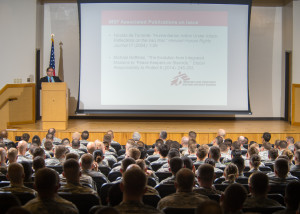In this past month, Associate Professor of History and American Studies Nabil Al-Tikriti discussed both military-NGO relations and contemporary Middle East politics at three public forums, each invited appearances.
On Oct. 6, in his capacity as a member of the MSF/Doctors Without Borders USA Board of Directors, Al-Tikriti addressed U.S. Army staff at Missouri’s Fort Leonard Wood. Appearing in five meetings overall, he discussed MSF’s field relationship with the U.S. and other military counterparts, particularly in cases he had either experienced or been informed about in Somalia, Albania, Turkey, Haiti, and other locales in the Middle East and Africa. He also presented the movement’s overall goals, orientations, and decisions throughout its history. Much of the day was concerned with explaining MSF’s determination to maintain its institutional neutrality, impartiality, and independence in field operations, particularly in conflict situations. In the wake of this lengthy and fruitful exchange of views, he remains grateful for the hospitality displayed by the U.S. Army counterparts he met at Fort Leonard Wood.
On Oct. 19, Al-Tikriti presented a talk to the National Community College Peacebuilding Seminar, entitled “Things Fall Apart: Prospects for Conflict in the Middle East and Beyond.” Integrated with a working dinner, Al-Tikriti offered a presentation which combined elements of his humanitarian field experience and scholarly expertise in Middle East studies to discuss the current direction of regional conflict, as well as the role of humanitarian actors in such conflicts. His presentation was part of a community college faculty seminar entitled “Teaching about Global Conflict and Resolution,” which was hosted by Northern Virginia Community College and funded by the U.S. Institute of Peace.
On Oct. 28, Al-Tikriti offered a lecture entitled “The Iraq Crisis Today” to over 100 students at the College of William & Mary in Williamsburg, Virginia. In the course of this presentation, Al-Tikriti surveyed the multiple legacies of U.S. foreign policy in the region, particularly the effects of the 2003 Anglo-American invasion on Iraqi and regional politics and society. This talk was sponsored by the College’s Middle Eastern Students Association, who hosted Al-Tikriti for a dinner after the lecture was completed.
